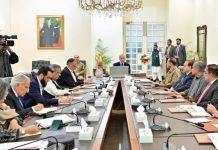ISLAMABAD, JAN 3 /DNA/ – Sabheen Ghoury, Parliamentary Secretary for Information Technology, called for consistent policies among governments to achieve sustainable progress, stating that environmental challenges were transnational and necessitate a collaborative approach.
She spoke at a roundtable on “Pak-China’s Vision for a Sustainable Future: Ecological Civilization, Environmental Security, and Global Harmony,” organized by the Institute of Regional Studies (IRS) in collaboration with China Global Television Network (CGTN) Urdu.
President IRS Ambassador Jauhar Saleem opened the session by stressing the roundtable’s significance amid major environmental changes. He commended China for its efforts to mitigate the adverse environmental impacts of rapid industrialization. He noted that, like their cooperation in economic and defense sectors, Pakistan and China also collaborate on critical issues such as climate resilience, mitigation, and adaptation.
Mr. Tasawar Zaman Babar, Program Coordinator at CGTN Urdu, commended Pakistan’s longstanding friendship with China, which has persisted through various administrations. He emphasized the importance of aligning economic development with environmental concerns in light of the current climate crisis.
Mr. Khalid Taimur Akram, Executive Director of the Pakistan Research Center for a Community with Shared Future (PRCCSF), echoed Ms. Ghoury’s sentiments, emphasizing that environmental hazards have regional, rather than national, implications. He argued that policies should reflect this regional scope and praised CPEC for its alignment with China’s Clean Green Energy initiative, which includes various renewable energy and water conservation projects. Mr. Asif Shuja Khan, former Director-General of Pakistan’s Environmental Protection Agency (EPA), highlighted the challenges of the 18th Amendment, which has led to a disconnect among provincial EPAs. He recommended focusing strategically on the transport and agriculture sectors and suggested measures such as utilizing low-sulphur coal, conducting Strategic Environmental Assessments (SEA) for the China-Pakistan Economic Corridor (CPEC), and planting trees along its route to promote carbon neutrality.
Dr. Shakeel Ahmad Ramay, CEO of the Asian Institute of Eco-civilization, Research, and Development (AIERD), discussed the Chinese notion of Ecological Civilization, rooted in Confucian teachings. He warned against hastily adopting Electric Vehicles (EVs) without sufficient infrastructure and emphasized the need to balance green transitions with livelihood concerns. Mr. Irfan Tariq, former Director-General of the Ministry of Climate Change, emphasized the need for Pakistan to focus on improving air quality and preserving glaciers by learning from China’s experiences. Dr. Rizwan Naseer, Senior Research Fellow at IRS, discussed China’s role in global governance, especially concerning unconventional security challenges like climate change. He praised China’s Green Revolution and its commitment to green energy, noting that China was the largest producer of various renewable energy sources, including hydro, wind, and solar.












